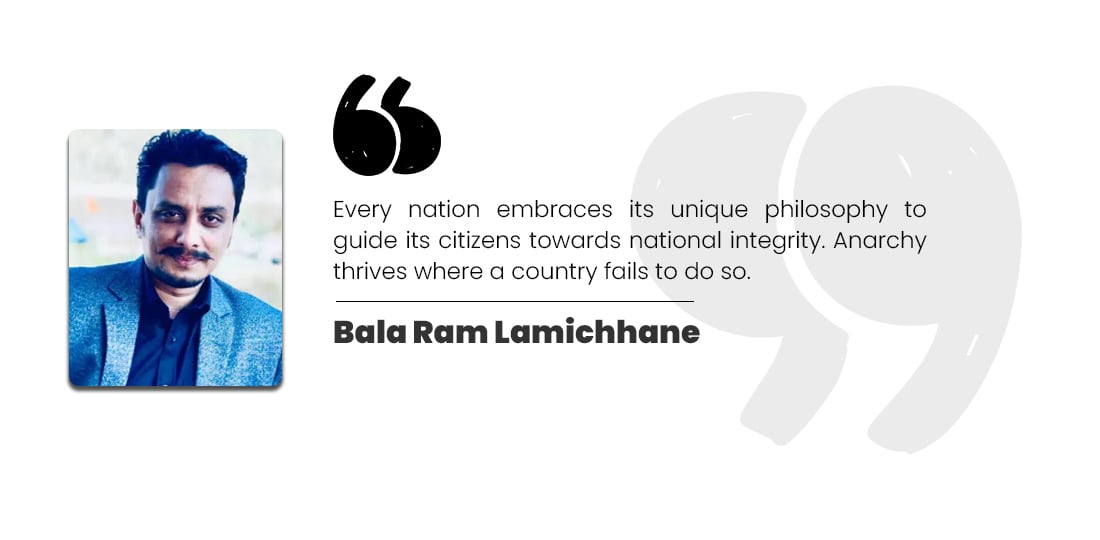If only Civil Diplomacy could expunge global resentment

Nepal witnessed a swift event course of history registering two major changes; dethroning monarchy and launching federalism. Introducing and establishing change in the history of any nation or society is catalyzed by substantial historical as well intellectual backgrounds. However, it is run and completed by people living in the same previous country and community, meaning, no alien settles any recognized civil uprising.
Leaving domestic issues aside and perceiving beyond the borders, the world is also spotted by countless misapprehensions between its people and their interests. In different chapters of history, the world has encountered imperialism, radical nationalism, genocides instigated by conflicts in faith and most recently, ICT's hegemony. Population loves to stay in peace, learning and practicing skills and assuring generational progress. At the same time, people want to conquer places, ideas and potentials.
Geographically sketched physical boundary is not always a punctual segregation from one human to another rather is a mere political division forming nations. That follows a development of a particular and distinct set of laws and regulations. Nevertheless, a sentiment remains intact and lives forever between people in this and that side of every physical border, overlooking the red lines in the map. That sagacity of association between technically called populations who are real human beings is in fact- civil diplomacy.
Every nation embraces its unique philosophy to guide its citizens towards national integrity. Anarchy thrives where a country fails to do so. But at the same time, rising above the level of nation and prospecting global, two vital questions are yet to be answered - Is the very philosophy lenient to our common kind? And, are only the historically signed treaties, truces and agreements preventing us from evading our neighbors?
Putting the same into example, Nepal shares its three sides border with India except northern. The southern region of Nepal, Terai, is adjacent with two Indian states Bihar and Uttar Pradesh where the inhabitants of both sides hugely share social, cultural and most importantly economic properties with each other. The border is virtual. Despite time and again emerging border issues and lacking robust bilateral talks to resolve the issues, the people in community level still are sharing and caring with each other with negligible community-level confrontations. This proves that the linking which prevails and has been prevailing since known history in these areas is due to the success of civil tolerance and understanding rather than any influence of national-level diplomacy.
There are numerous countries in the world that share borders and share linguistic, cultural and historical commonalities but are strictly scrutinized crossing by national security like North Korea and South Korea, is an exception with an authoritarian rule at least on the one side. Also, some Asian nations like Pakistan-Afghanistan, Iran-Iraq, Israel-Palestine and India-Pakistan who share border are relatively strict to allow movement across because of the issues like terrorism and physical border disputes with each other.
Where the international understanding fails to exist, emphatic application of sanctions/embargos are practiced expecting compliance from the target state. Though those cause immense humanitarian crises, no diplomatic mission submits its incompetence to resolve the issues avoiding such restrictions. The established norms or principles of diplomatic sanctions has been overlooking the severity of 'indefinite sanctions' while pushing a state into isolation. This is where exactly a spirited practice of civil diplomacy could resume the conversation in a basic level and revive communication between states to unclutter
The world would not be able to tolerate any extreme level of confrontations and especially wars in this period of history with participation of those nations who are rich with nuclear weapons having the possibility of incalculable yet imminent devastation that could obliterate modern civilization. Every civil society is not directly involved in strategic diplomatic exercise in different geographical corners, nevertheless waits for an extension of ever happening but less resulting in government diplomacy's effort in considering civil diplomacy as a humble and viable alternative.
(Writer is a student of diplomacy and an educator).









Leave Comment